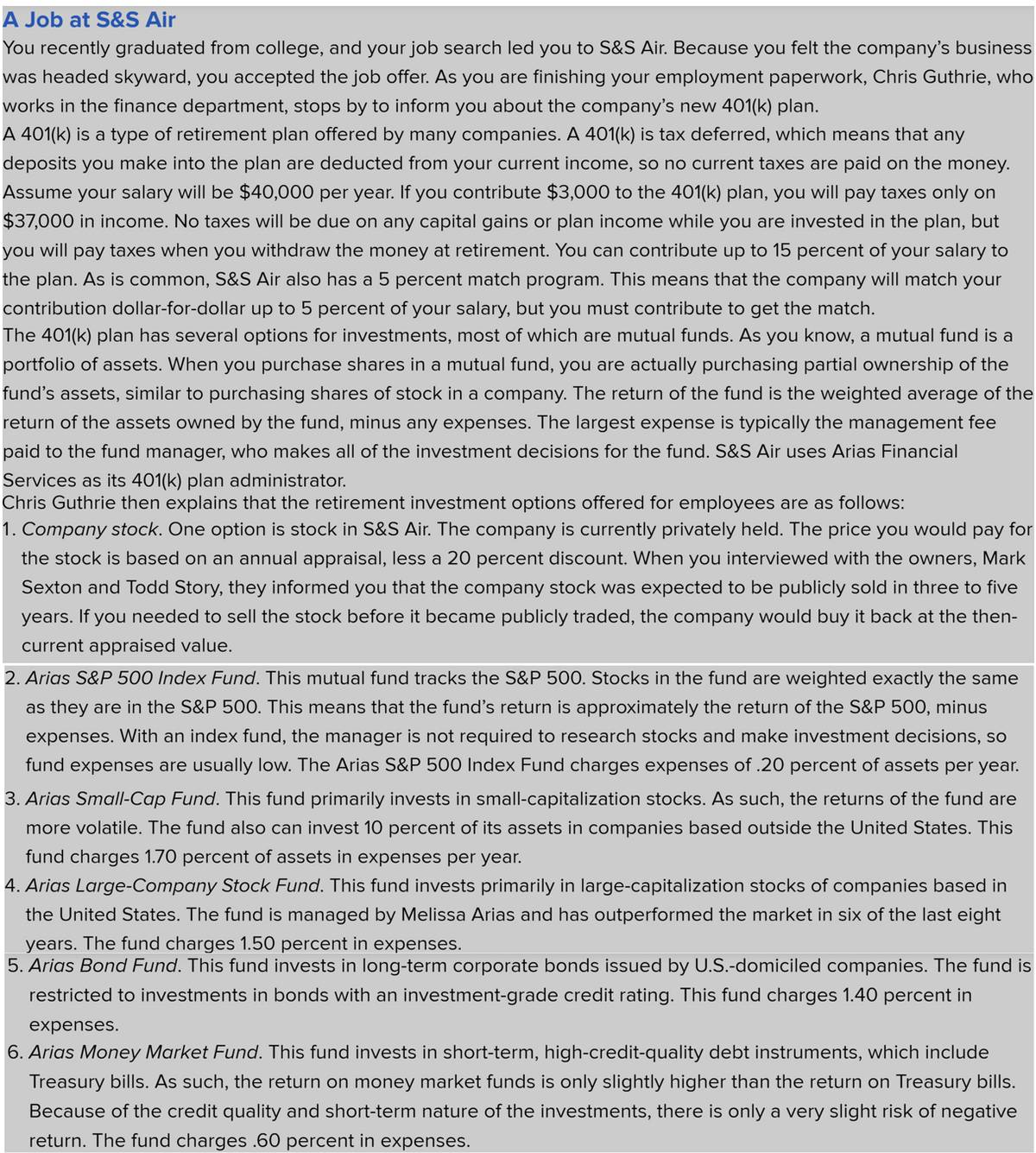Chapter11: Long-term Assets
Section: Chapter Questions
Problem 1TP: You are an accounting student at your local university. Your brother has recently managed to save...
Related questions
Question
What advantages/disadvantages do the mutual funds offer compared to company stock for your retirement investing?

Transcribed Image Text:A Job at S&S Air
You recently graduated from college, and your job search led you to S&S Air. Because you felt the company's business
was headed skyward, you accepted the job offer. As you are finishing your employment paperwork, Chris Guthrie, who
works in the finance department, stops by to inform you about the company's new 401(k) plan.
A 401(k) is a type of retirement plan offered by many companies. A 401(k) is tax deferred, which means that any
deposits you make into the plan are deducted from your current income, so no current taxes are paid on the money.
Assume your salary will be $40,000 per year. If you contribute $3,000 to the 401(k) plan, you will pay taxes only on
$37,000 in income. No taxes will be due on any capital gains or plan income while you are invested in the plan, but
you will pay taxes when you withdraw the money at retirement. You can contribute up to 15 percent of your salary to
the plan. As is common, S&S Air also has a 5 percent match program. This means that the company will match your
contribution dollar-for-dollar up to 5 percent of your salary, but you must contribute to get the match.
The 401(k) plan has several options for investments, most of which are mutual funds. As you know, a mutual fund is a
portfolio of assets. When you purchase shares in a mutual fund, you are actually purchasing partial ownership of the
fund's assets, similar to purchasing shares of stock in a company. The return of the fund is the weighted average of the
return of the assets owned by the fund, minus any expenses. The largest expense is typically the management fee
paid to the fund manager, who makes all of the investment decisions for the fund. S&S Air uses Arias Financial
Services as its 401(k) plan administrator.
Chris Guthrie then explains that the retirement investment options offered for employees are as follows:
1. Company stock. One option is stock in S&S Air. The company is currently privately held. The price you would pay for
the stock is based on an annual appraisal, less a 20 percent discount. When you interviewed with the owners, Mark
Sexton and Todd Story, they informed you that the company stock was expected to be publicly sold in three to five
years. If you needed to sell the stock before it became publicly traded, the company would buy it back at the then-
current appraised value.
2. Arias S&P 500 Index Fund. This mutual fund tracks the S&P 500. Stocks in the fund are weighted exactly the same
as they are in the S&P 500. This means that the fund's return is approximately the return of the S&P 500, minus
expenses. With an index fund, the manager is not required to research stocks and make investment decisions, so
fund expenses are usually low. The Arias S&P 500 Index Fund charges expenses of .20 percent of assets per year.
3. Arias Small-Cap Fund. This fund primarily invests in small-capitalization stocks. As such, the returns of the fund are
more volatile. The fund also can invest 10 percent of its assets in companies based outside the United States. This
fund charges 1.70 percent of assets in expenses per year.
4. Arias Large-Company Stock Fund. This fund invests primarily in large-capitalization stocks of companies based in
the United States. The fund is managed by Melissa Arias and has outperformed the market in six of the last eight
years. The fund charges 1.50 percent in expenses.
5. Arias Bond Fund. This fund invests in long-term corporate bonds issued by U.S.-domiciled companies. The fund is
restricted to investments in bonds with an investment-grade credit rating. This fund charges 1.40 percent in
expenses.
6. Arias Money Market Fund. This fund invests in short-term, high-credit-quality debt instruments, which include
Treasury bills. As such, the return on money market funds is only slightly higher than the return on Treasury bills.
Because of the credit quality and short-term nature of the investments, there is only a very slight risk of negative
return. The fund charges .60 percent in expenses.
Expert Solution
This question has been solved!
Explore an expertly crafted, step-by-step solution for a thorough understanding of key concepts.
This is a popular solution!
Trending now
This is a popular solution!
Step by step
Solved in 3 steps

Knowledge Booster
Learn more about
Need a deep-dive on the concept behind this application? Look no further. Learn more about this topic, finance and related others by exploring similar questions and additional content below.Recommended textbooks for you

Principles of Accounting Volume 1
Accounting
ISBN:
9781947172685
Author:
OpenStax
Publisher:
OpenStax College


Cornerstones of Cost Management (Cornerstones Ser…
Accounting
ISBN:
9781305970663
Author:
Don R. Hansen, Maryanne M. Mowen
Publisher:
Cengage Learning

Principles of Accounting Volume 1
Accounting
ISBN:
9781947172685
Author:
OpenStax
Publisher:
OpenStax College


Cornerstones of Cost Management (Cornerstones Ser…
Accounting
ISBN:
9781305970663
Author:
Don R. Hansen, Maryanne M. Mowen
Publisher:
Cengage Learning